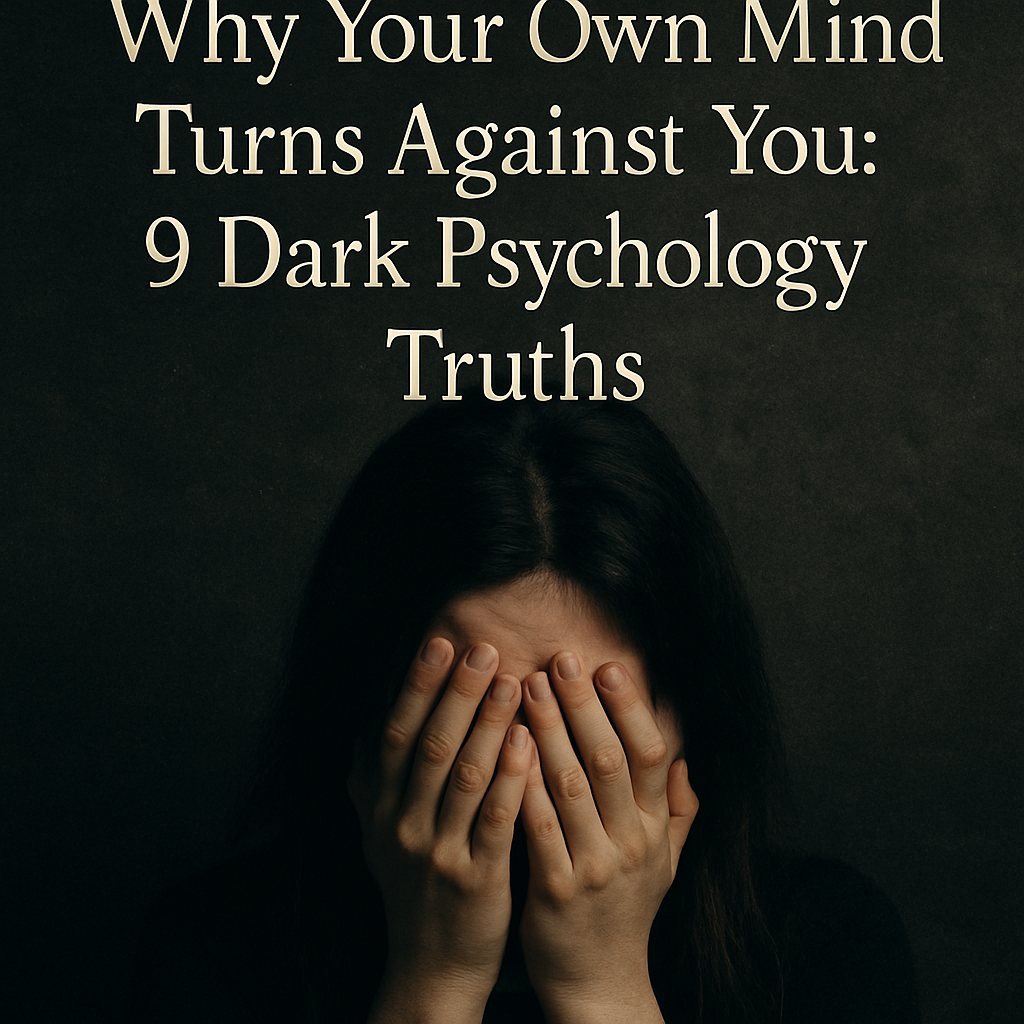Why Your Own Mind Turns Against You: 9 Dark Psychology Truths

“The scariest battles aren’t fought with other people. They’re fought in your own head.”
There are nights when it feels like your brain is your worst enemy. It replays the past like a broken record, whispers lies about your worth, and convinces you that you’re unlovable even in rooms full of people. You wonder, why do I keep doing this to myself?
The answer isn’t that you’re weak. It’s that the human mind was built for survival, not happiness. And sometimes, survival strategies feel like self-sabotage. Here are nine dark truths about the mind that explain why your thoughts sometimes turn against you.
1. Lies Don’t Need Proof, Just Repetition
You don’t need evidence to believe something. You just need to hear it enough times, especially from yourself. “I’m not good enough.” “No one stays.” Repeated thoughts are like drops of ink in water; eventually, they stain everything.
2. We Grow Attached After We Invest
Often, it’s not love that makes us give, it’s giving that makes us love. You do someone a small favor, and your brain stitches the story backward: I must care, or why would I bother? Affection is built on investment, not always intimacy.
3. The Masks Become the Face
We perform: the polite smile, the strong one, the always-okay act. But wear a mask long enough, and it stops being a disguise. It fuses. One day, you can’t tell where the performance ends and you begin.
4. Rejection Feels Physical Because It Is
Being ghosted, excluded, or ignored lights up the same brain regions as physical pain. That “broken heart” isn’t just poetry, it’s neurology. The bruise is real, only invisible.
5. We Invent Reasons So We Feel in Control
The brain hates not knowing. So when we don’t understand our own choices, it fabricates explanations. “I left because of X.” “They changed because of Y.” Often, those stories aren’t true, but they’re easier than facing the chaos of I don’t know.
The Psychology of the Gen Z Stare
The Secret Danger of Narcissism in Boys: Early Indicators Parents Must Not Overlook - New!
The Shocking Truth About Emojis and Narcissism: What Your Emoji Use Might Say About You
6. Attention Creates Importance
The more we hear something, the more significant it feels, even if it’s trivial. Noise becomes truth, volume becomes value. That’s how rumors spread, obsessions start, and lies grow legs, they’re just loud.
7. We Betray Our Future Selves
Your brain sees “Future You” as someone else entirely—someone richer, stronger, more disciplined. So you offload every burden onto them. The bills, the deadlines, the consequences. And when the day arrives, the stranger who has to carry it is you.
8. Scarcity Warps the Mind
When you feel deprived, of love, money, time—your brain tunnels in on what’s missing. The rest of the world fades. That’s why loneliness makes any attention feel intoxicating, and debt makes terrible deals look like lifelines. Scarcity steals perspective.
9. Belonging Outweighs Truth
We don’t cling to facts. We cling to tribes. If believing something keeps us inside the circle, we’ll twist reality until it bends. We’ll reject truth before we’ll risk being alone.
The Uncomfortable Truth
The mind is a survival machine. It doesn’t care about your joy. It doesn’t care about your dreams. It cares about keeping you breathing, keeping you accepted, keeping you alert to danger. That’s why it feels like the enemy sometimes—because survival and happiness are not the same thing.
But here’s the quiet power: the moment you name the trick, you loosen its grip. Once you see the shadows, they can’t steer you blindly anymore.
Recommended Readings
- Is Life Meaningful Without Suffering?
- 🛑 You Are Not a Machine
- Your Partner Says They Love You, But Here’s 8 Brutal Signs They Don’t Respect You
- 🧠 101 Bizarre Psychology Facts You Won’t Believe Are True
- The Dark Psychology of Modernization: Where It’s Taking Us - And Where It Ends
- 🧠 101 Dark Psychology Truths Behind Overthinking
- Dark Psychology: 7 Chilling Truths Manipulators Don’t Want You to Know
- 7 Hard Truths About Life & Psychology
- 💔 What If You Die in Two Weeks, and Nobody Remembers You?
- What a Timex Says About You: The Philosophy of Value, Ego, and Persuasion



